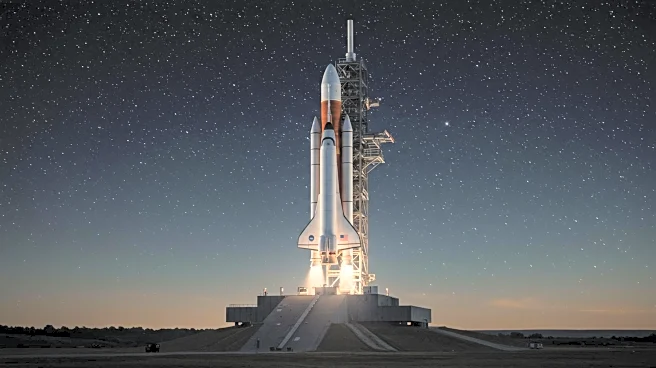What is the story about?
What's Happening?
Blue Origin is preparing for the second launch of its New Glenn rocket, scheduled to carry NASA's ESCAPADE mission to Mars on September 29, 2025. The mission involves twin probes designed to study Mars' magnetosphere and the interaction of solar wind with the Martian atmosphere. This launch marks a significant milestone for Blue Origin, as it will be the first time New Glenn is tasked with an interplanetary mission. The mission, valued at $80 million, is managed by the University of California's Space Sciences Laboratory. Additionally, the rocket will carry a secondary payload from Viasat, aimed at enhancing satellite communications as part of NASA's Communications Services Project.
Why It's Important?
The launch of the ESCAPADE mission is crucial for advancing scientific understanding of Mars' space environment, which could have implications for future exploration and potential colonization. Blue Origin's success with New Glenn could bolster its position in the competitive commercial launch industry, particularly for larger payloads. The mission also represents a significant step towards reusable rocket technology, which could reduce the cost of space travel. The secondary payload from Viasat is expected to play a vital role in advancing space-based communications, essential for future missions to the Moon and Mars.
What's Next?
Following the launch, Blue Origin plans to recover the first stage booster using a drone ship in the Atlantic Ocean, aiming to achieve a fully reusable rocket system. The success of this recovery operation is critical for the company's long-term goals in reducing space travel costs. The ESCAPADE probes will begin their journey to Mars, providing data to help scientists understand the dynamics of the planet's magnetosphere. The technology demonstration from Viasat will contribute to NASA's efforts in enhancing satellite communications for future interplanetary missions.
Beyond the Headlines
The development of reusable rockets by Blue Origin could lead to more sustainable and cost-effective space exploration, potentially opening up new opportunities for scientific research and commercial ventures. The ESCAPADE mission's findings may influence future Mars exploration strategies, including human missions. The advancement in satellite communications technology could improve connectivity for space missions, facilitating more complex operations and collaborations between international space agencies.
















